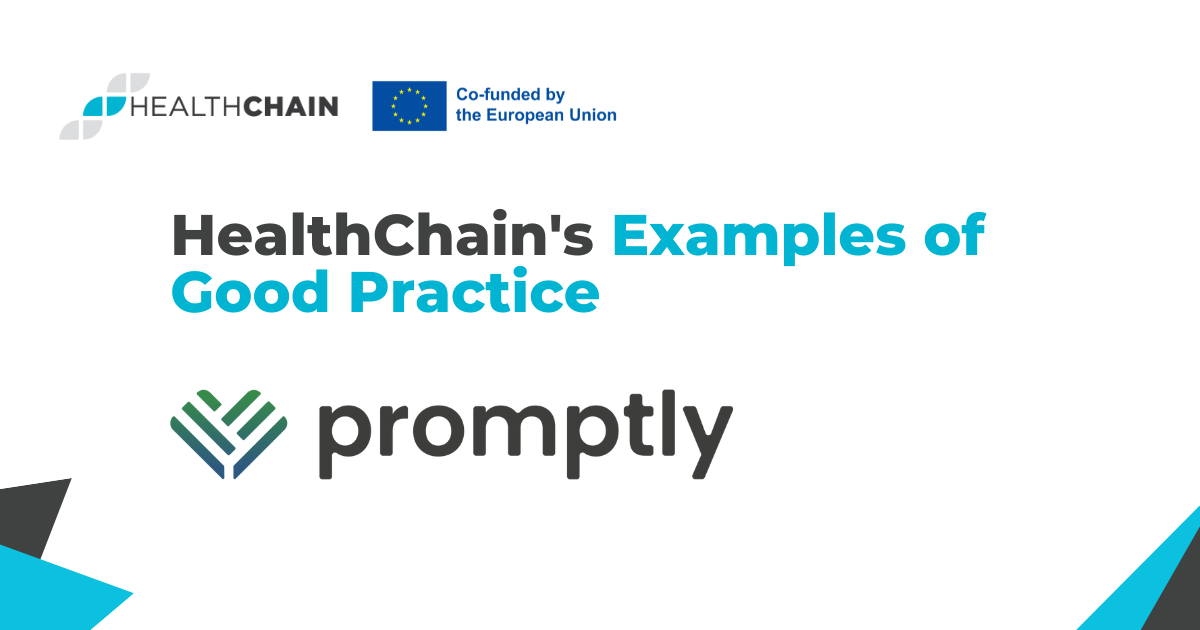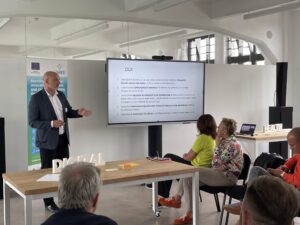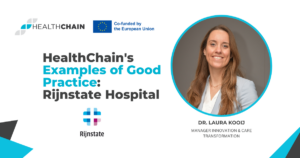Welcome to HealthChain’s Examples of Good Practice, a series dedicated to showcasing exemplary companies, healthcare institutions, innovative solutions, and business models that are driving transformation across the European healthcare sector.
In this edition, we are pleased to present Promptly Health, an innovative Portuguese MedTech SME at the forefront of leveraging healthcare data to advance the generation of real-world evidence (RWE).
Tell us more about the Promptly Health.
Promptly Health is a Portuguese health tech company, founded in 2017 and based in Porto, on a mission to break down the barriers of fragmented and siloed healthcare data. As a MedTech SME, Promptly develops advanced Software as a Service (SaaS) platform that enable the generation of real-world evidence (RWE). Our end-to-end solution connects diverse healthcare organizations through a secure, federated network, enhancing interoperability and enabling robust analysis across multi-institutional datasets. By turning complex data into actionable insights, Promptly empowers healthcare providers, researchers and policymakers to make more informed decisions that improve patient outcomes.
Currently operating in 6 countries, in partnership with some of the most visionary and forward-looking healthcare organizations across the world, we make these health outcomes available to promote better healthcare at lower costs for thousands of new patients every day through the use of RWE.
What are the main solutions/services that Promptly provides in the healthcare sector?
Promptly Health provides a comprehensive suite of solutions in the healthcare sector, focusing on RWE generation, patient engagement, data harmonization and analytics. Our services are designed to support healthcare providers, stakeholders and life sciences companies in improving care delivery, conducting research, and implementing value-based healthcare models.
Key Solutions and Services:
- Real-World Evidence Network: Promptly operates a federated data infrastructure that connects diverse healthcare stakeholders, enabling the secure sharing and utilization of harmonized datasets. This network not only facilitates multicentric RWE studies that contribute to the improvement of clinical care, but also creates new revenue opportunities for data-contributing organizations through participation in high-value research collaborations.
- Promptly Collect: A patient-centric platform designed to capture patient-reported outcomes (PROs) at scale. It employs an omnichannel engagement strategy (SMS, Email, Interactive Voice Response) to maximize patient participation and supports features like consent management, data pseudonymization and outcomes analytics.
- Data Harmonization: Promptly harmonizes real-world data from diverse sources by transforming them into a unified, structured format using the internationally recognized Observational Medical Outcomes Partnership (OMOP) Common Data Model (CDM), resolving discrepancies in data formatting, terminology, and classification. This standardization enhances research capacity, facilitates multicentric collaboration, and ensures the data is de-identified and compliant with leading data governance and security standards.
- Data Analytics: The platform offers real-time analytics tools that provide insights into patient outcomes, care performance, and operational efficiency. Users can explore pre-built dashboards that highlight trends across patient populations, benchmark outcomes against peer institutions or standards, and surface opportunities for clinical and operational improvement.
- Secure Data Environments: Promptly sets up secure environments where datasets are harmonized and made accessible for real-world data collaborations. This federated approach ensures that sensitive data remains within the institution’s ownership, preserving privacy and security.
Through these solutions, Promptly Health enables healthcare organizations to unlock the value of their data assets, engage in high-impact research, and transition towards value-based healthcare models
What is your company’s typical process f rom identifying unmet needs and opportunities to a successful solution?
At Promptly Health, our innovation process is driven by both real-world clinical needs and strategic research and development opportunities. It begins with close collaboration with healthcare providers, patients and other key stakeholders to identify unmet needs where real-world data (RWD) can have a transformative impact – whether through improved outcomes measurement, enhanced patient engagement or robust evidence generation.
On the commercial side, we prioritize high impact use cases and co-design solutions with end-users, to ensure seamless integration into clinical workflows and alignment with data governance and privacy standards. Using agile development and our modular platform, we deliver tailored solutions efficiently, incorporating continuous feedback and tracking measurable outcomes to guide scalability and reuse across diverse healthcare settings.
In parallel, we actively pursue R&D opportunities through soft funding programs such as Horizon Europe’s IA/RIA, Pre-Commercial Procurements and Innovative Health Initiative. These opportunities allow us to explore cutting-edge capabilities, extend the boundaries of our technology and align with emerging scientific and regulatory standards. This dual-track approach – balancing market-driven needs with forward-looking innovation and fosters a culture of continuous improvement and positions Promptly as both a reliable partner and a pioneer in RWE generation.
What are some of the biggest hurdles you see for innovative SMEs in healthcare? And what are your thoughts on the future of healthcare innovation in Europe?
One of the main challenges for innovative SMEs in healthcare lies in navigating the complexity of Europe’s diverse health data ecosystems. Interoperability across systems, compliance with stringent data protection regulations like the General Data Protection Regulation (GDPR) and securing alignment among multiple stakeholders – ranging from clinicians and patients to policymakers – can pose significant barriers, particularly when trying to scale solutions across borders.
Integration into real-world clinical workflows is another critical hurdle. This requires not just technical compatibility, but also the establishment of trust, generation of robust
evidence and close collaboration with healthcare providers. For smaller companies with limited resources, these requirements can be difficult to meet without strong partnerships and support mechanisms.
Therefore, the future of healthcare innovation in Europe is highly promising. The upcoming implementation of the European Health Data Space (EHDS) marks a major step forward. By fostering a harmonized framework for health data sharing and reuse, EHDS has the potential to lower entry barriers for SMEs, enhance interoperability and accelerate the development and adoption of innovative solutions across the EU.
At Promptly, we see initiatives like the EHDS as essential to push the boundaries of what’s possible in health innovation. It is a significant advancement in the alignment of technological development with broader policy and societal goals. As a company focused on real-world data and federated infrastructures, we believe SMEs – like Promptly – will play a central role in shaping a more resilient, equitable and data-driven European healthcare system.
From your perspective, how important are projects like HealthChain and EU funding mechanisms in supporting the growth and impact of healthcare innovations across Europe?
Projects such as HealthChain, along with broader EU funding mechanisms under Horizon Europe, play a critical role in supporting the growth and real-world impact of healthcare innovation, especially for SMEs. These initiatives provide the necessary resources, and framework needed to validate and scale solutions in complex, real-world healthcare environments. One particularly valuable aspect is the ability of these projects to foster structured, cross-sectoral collaboration. By bringing together public institutions, academia and the industry, these programs help to promote a shared innovation goal across EU member states. While encouraging the adoption of common standards, which are essential in achieving interoperability and maximizing the secondary use of health data.
For Promptly Health, such programs accelerate the adoption of real-world evidence and the scaling of interoperable solutions. They serve not only as funding mechanisms but as ecosystems that amplify impact, promote standardization and reduce barriers to market entry – contributing to a more unified and innovative European health landscape.
A big thank you to the entire Promptly Health team for sharing their expertise and for their commitment to shaping the future of healthcare through data-driven innovation.








